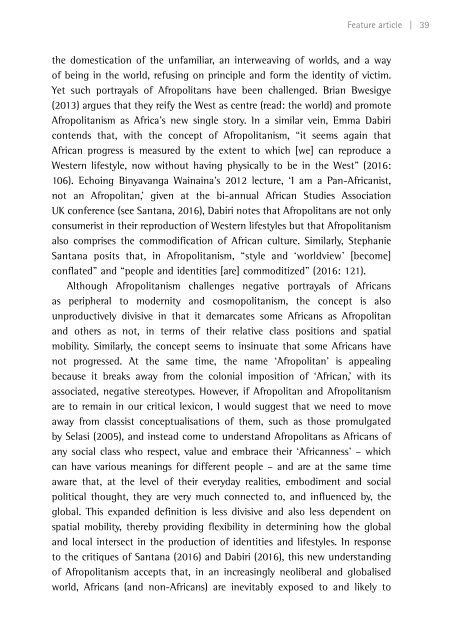The politics of fashion and beauty in Africa
fa21_proof_3
fa21_proof_3
Create successful ePaper yourself
Turn your PDF publications into a flip-book with our unique Google optimized e-Paper software.
Feature article | 39<br />
the domestication <strong>of</strong> the unfamiliar, an <strong>in</strong>terweav<strong>in</strong>g <strong>of</strong> worlds, <strong>and</strong> a way<br />
<strong>of</strong> be<strong>in</strong>g <strong>in</strong> the world, refus<strong>in</strong>g on pr<strong>in</strong>ciple <strong>and</strong> form the identity <strong>of</strong> victim.<br />
Yet such portrayals <strong>of</strong> Afropolitans have been challenged. Brian Bwesigye<br />
(2013) argues that they reify the West as centre (read: the world) <strong>and</strong> promote<br />
Afropolitanism as <strong>Africa</strong>’s new s<strong>in</strong>gle story. In a similar ve<strong>in</strong>, Emma Dabiri<br />
contends that, with the concept <strong>of</strong> Afropolitanism, “it seems aga<strong>in</strong> that<br />
<strong>Africa</strong>n progress is measured by the extent to which [we] can reproduce a<br />
Western lifestyle, now without hav<strong>in</strong>g physically to be <strong>in</strong> the West” (2016:<br />
106). Echo<strong>in</strong>g B<strong>in</strong>yavanga Wa<strong>in</strong>a<strong>in</strong>a’s 2012 lecture, ‘I am a Pan-<strong>Africa</strong>nist,<br />
not an Afropolitan,’ given at the bi-annual <strong>Africa</strong>n Studies Association<br />
UK conference (see Santana, 2016), Dabiri notes that Afropolitans are not only<br />
consumerist <strong>in</strong> their reproduction <strong>of</strong> Western lifestyles but that Afropolitanism<br />
also comprises the commodification <strong>of</strong> <strong>Africa</strong>n culture. Similarly, Stephanie<br />
Santana posits that, <strong>in</strong> Afropolitanism, “style <strong>and</strong> ‘worldview’ [become]<br />
conflated” <strong>and</strong> “people <strong>and</strong> identities [are] commoditized” (2016: 121).<br />
Although Afropolitanism challenges negative portrayals <strong>of</strong> <strong>Africa</strong>ns<br />
as peripheral to modernity <strong>and</strong> cosmopolitanism, the concept is also<br />
unproductively divisive <strong>in</strong> that it demarcates some <strong>Africa</strong>ns as Afropolitan<br />
<strong>and</strong> others as not, <strong>in</strong> terms <strong>of</strong> their relative class positions <strong>and</strong> spatial<br />
mobility. Similarly, the concept seems to <strong>in</strong>s<strong>in</strong>uate that some <strong>Africa</strong>ns have<br />
not progressed. At the same time, the name ‘Afropolitan’ is appeal<strong>in</strong>g<br />
because it breaks away from the colonial imposition <strong>of</strong> ‘<strong>Africa</strong>n,’ with its<br />
associated, negative stereotypes. However, if Afropolitan <strong>and</strong> Afropolitanism<br />
are to rema<strong>in</strong> <strong>in</strong> our critical lexicon, I would suggest that we need to move<br />
away from classist conceptualisations <strong>of</strong> them, such as those promulgated<br />
by Selasi (2005), <strong>and</strong> <strong>in</strong>stead come to underst<strong>and</strong> Afropolitans as <strong>Africa</strong>ns <strong>of</strong><br />
any social class who respect, value <strong>and</strong> embrace their ‘<strong>Africa</strong>nness’ – which<br />
can have various mean<strong>in</strong>gs for different people – <strong>and</strong> are at the same time<br />
aware that, at the level <strong>of</strong> their everyday realities, embodiment <strong>and</strong> social<br />
political thought, they are very much connected to, <strong>and</strong> <strong>in</strong>fluenced by, the<br />
global. This exp<strong>and</strong>ed def<strong>in</strong>ition is less divisive <strong>and</strong> also less dependent on<br />
spatial mobility, thereby provid<strong>in</strong>g flexibility <strong>in</strong> determ<strong>in</strong><strong>in</strong>g how the global<br />
<strong>and</strong> local <strong>in</strong>tersect <strong>in</strong> the production <strong>of</strong> identities <strong>and</strong> lifestyles. In response<br />
to the critiques <strong>of</strong> Santana (2016) <strong>and</strong> Dabiri (2016), this new underst<strong>and</strong><strong>in</strong>g<br />
<strong>of</strong> Afropolitanism accepts that, <strong>in</strong> an <strong>in</strong>creas<strong>in</strong>gly neoliberal <strong>and</strong> globalised<br />
world, <strong>Africa</strong>ns (<strong>and</strong> non-<strong>Africa</strong>ns) are <strong>in</strong>evitably exposed to <strong>and</strong> likely to



